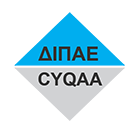
Bachelor
240 ects
Greek
Internationally Recognised
Online application submission

The bachelor degree in Business Administration (BSc) aims to the transmission of knowledge, problems analysis methodology, technical knowledge and functional tools that are essential in the world of business administration.
Provision of this knowledge is fulfilled by taking into consideration its application both in decision-making in the sector of business administration and in achieving better business operation.
European Credit Units - ECTS: 240
Teaching Language: Greek
Level of Studies: Undergraduate
Title to be Awarded: Bachelor’s degree (BSc)
The programme is evaluated and accredited by:
Undergraduate students will acquire basic knowledge in many of these aspects of the business world, before choosing a specialisation. The combination of academic challenge and practical focus makes the prospect of studying business highly appealing to those attracted to the competitive, yet collaborative learning environment offered by many business schools and departments.
Business graduates go on to work in various sectors, and not all of them are those you would typically associate with business in general. More obvious careers with a business degree include roles in accounting and finance departments, which take in large numbers of business degree graduates. Other sectors with high demand for business graduates include marketing and advertising, as well as retail, sales, human resources and business consultancy. The diversity and plenitude of careers with a business degree underlies the interest of many students. The programme content is supported with case studies from the local and international business environment, while in a number of modules, real world business applications and simulations are used to facilitate learning.
The Open University of Cyprus (OUC), through its participation in the European project "Liaison Offices with the Labour Market", offers to students of all its programmes of study, the optional and free of charge Thematic Unit (i.e. Module) entitled "Industry Placement". This module provides students opportunities for a placement to gain professional experience in their particular field of study, and the hosting institution can be any public or private organisation operating in the Republic of Cyprus.
Each student has the right to participate in this offering once or twice during his / her studies, provided that s/he meets the required conditions.
Request more information by contacting the OUC Liaison Office here.
Applicants must hold a secondary education degree (or equivalent). Good computer skills (internet and email) are needed. Sufficient English language knowledge is desirable.
The total administrative cost of the Programme is €8400. The cost of each Module is €350. Administrative costs are charged per Module.
The total administrative cost for non E.U. citizens is €10920 and the cost of each Module is €455.
Programme Structure
For the successful completion of the bachelor programme in Business Administration, students must successfully undertake twenty-four (24) modules.
The number of modules required for all the students are the following nineteen (19): ΠΔΕ101, ΠΔΕ102, ΠΔΕ103, ΠΔΕ151, ΠΔΕ152, ΠΔΕ153, ΠΔΕ201, ΠΔΕ202, ΠΔΕ203, ΠΔΕ251, ΠΔΕ252, ΠΔΕ253, ΠΔΕ301, ΠΔΕ302, ΠΔΕ303, ΠΔΕ351, ΠΔΕ352, ΠΔΕ353 and ΠΔΕ451.
The electives modules are the following eight (8): ΠΔΕ401, ΠΔΕ402, ΠΔΕ403, ΠΔΕ404, ΠΔΕ452, ΠΔΕ453, ΠΔΕ454 και ΠΔΕ455. Students will choose five (5) out of eight (8) electives modules to complete the programme.
Students can undertake up to three (3) modules per semester. Full-time study of the programme requires the selection of three (3) modules whereas the selection of one (1) or (2) modules is considered part-time.
For the successful completion of each Module, students, under the supervision of their Professors, are required to submit two (2) written assignments per Module.
At the end of each semester, students must sit final written exams for each module.
|
Programme of Study Layout |
|||||||
|
Modules |
Semester |
Required / Elective |
Pre-requisite Modules |
Co-requisite Modules |
Workload |
||
|
Hours |
ECTS |
||||||
|
ΠΔΕ101 |
Principles of Management |
1 (fall) |
Required |
250 - 300 |
10 |
||
|
ΠΔΕ102 |
Business Microeconomics |
1 (fall) |
Required |
250 - 300 |
10 |
||
|
ΠΔΕ103 |
Quantitative Methods in Business I |
1 (fall) |
Required |
250 - 300 |
10 |
||
|
ΠΔΕ151 |
Principles Financial Accounting |
2 (spring) |
Required |
250 - 300 |
10 |
||
|
ΠΔΕ152 |
Business Macroeconomics |
2 (spring) |
Required |
250 - 300 |
10 |
||
|
ΠΔΕ153 |
Quantitative Methods in Business II |
2 (spring) |
Required |
250 - 300 |
10 |
||
|
ΠΔΕ201 |
Managerial Accounting |
3 (fall) |
Required |
ΠΔΕ151 |
250 - 300 |
10 |
|
|
ΠΔΕ202 |
Principles of Marketing |
3 (fall) |
Required |
250 - 300 |
10 |
||
|
ΠΔΕ203 |
Management Information Systems |
3 (fall) |
Required |
250 - 300 |
10 |
||
|
ΠΔΕ251 |
Introduction to Corporate Finance |
4 (spring) |
Required |
ΠΔΕ102, ΠΔΕ152 |
250 - 300 |
10 |
|
|
ΠΔΕ252 |
Organizational Behavior |
4 (spring) |
Required |
ΠΔΕ101 |
250 - 300 |
10 |
|
|
ΠΔΕ253 |
Introduction to Management Science |
4 (spring) |
Required |
ΠΔΕ103 |
250 - 300 |
10 |
|
|
ΠΔΕ301 |
Money and Banking |
5 (fall) |
Required |
ΠΔΕ102, ΠΔΕ152 |
250 - 300 |
10 |
|
|
ΠΔΕ302 |
Human Resource Management |
5 (fall) |
Required |
ΠΔΕ252 |
250 - 300 |
10 |
|
|
ΠΔΕ303 |
Introduction to Service Management |
5 (fall) |
Required |
|
250 - 300 |
10 |
|
|
ΠΔΕ351 |
Advanced Corporate Finance |
6 (spring) |
Required |
ΠΔΕ251 |
250 - 300 |
10 |
|
|
ΠΔΕ352 |
Operations Management |
6 (spring) |
Required |
ΠΔΕ253 |
250 - 300 |
10 |
|
|
ΠΔΕ353 |
Investment and Portfolio Management |
6 (spring) |
Required |
ΠΔΕ251 |
250 - 300 |
10 |
|
|
ΠΔΕ401 |
Leadership |
7 (fall) |
Elective |
ΠΔΕ252 |
250 - 300 |
10 |
|
|
ΠΔΕ402 |
Contemporary Topics in Business Administration |
7 (fall) |
Elective |
ΠΔΕ101 |
250 - 300 |
10 |
|
|
ΠΔΕ403 |
International Marketing |
7 (fall) |
Elective |
ΠΔΕ202 |
250 - 300 |
10 |
|
|
ΠΔΕ404 |
Commercial and Administrative Law |
7 (fall) |
Elective |
ΠΔΕ151, ΠΔΕ201 |
250 - 300 |
10 |
|
|
ΠΔΕ451 |
Business Policy |
8 (spring) |
Required |
ΠΔΕ101, ΠΔΕ202, ΠΔΕ351, ΠΔΕ352 |
250 - 300 |
10 |
|
|
ΠΔΕ452 |
Financial Statement Analysis |
8 (spring) |
Elective |
ΠΔΕ201, ΠΔΕ251 |
250 - 300 |
10 |
|
|
ΠΔΕ453 |
Contemporary Topics in Marketing |
8 (spring) |
Elective |
ΠΔΕ202 |
250 - 300 |
10 |
|
|
ΠΔΕ454 |
Public Administration, Policy and Budgeting |
8 (spring) |
Elective |
ΠΔΕ102, ΠΔΕ152, ΠΔΕ201 |
250 - 300 |
10 |
|
|
ΠΔΕ455 |
Labor Relations |
8 (spring) |
Elective |
ΠΔΕ302 |
250 - 300 |
10 |
|
| Total | 6000 - 7200 | 240 | |||||
| Industry Placement | |||||||
|
ΠΔΕ495 |
Industry Placement (1st placement) |
8 (spring) |
Optional |
ΠΔΕ101, ΠΔΕ102, ΠΔΕ103, ΠΔΕ151, ΠΔΕ152, ΠΔΕ153, ΠΔΕ201, ΠΔΕ202, ΠΔΕ203, ΠΔΕ251, ΠΔΕ252,ΠΔΕ253 |
125 - 150 |
5 |
|
| ΠΔΕ496 | Industry Placement (2nd placement) | 8 (spring) | Optional | ΠΔΕ495 | 125 - 150 | 5 | |
Each student can optionally enrol, once or twice, in the free of charge Thematic Module "Industry Placement", which awards five (5) ECTS. The module offers a structured placement, designed to offer students specific industry and professional experience in their particular field of study, and to allow them to build their skills in a real-world setting.
ΠΔΕ495 - Industry Placement (1st placement)
ΠΔΕ496 - Industry Placement (2nd placement)
Request more information by contacting the OUC Career and Liaison Office here.
Academic Personnel
Constantinos Leonidou, Professor, Programme Director, E-mail:
Academic Consultation Hours: Monday, 13:00-18:00
Andreas Procopiou, Assistant Professor, E-mail:
Academic Consultation Hours: Tuesday, 11:00-16:00
Andrie Georgiou Michaelidou, Lecturer, ΠΔΕ455,
Academic Consultation Hours: Tuesday, 10:00-15:00
Marina Magidou, Lecturer, ΠΔΕ251,
Academic Consultation Hours: Tuesday, 11:00-16:00
For additional information, please contact Ms. Pitsillou Maria (



































